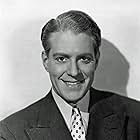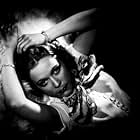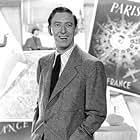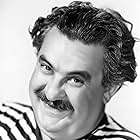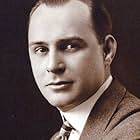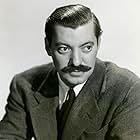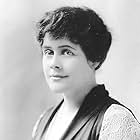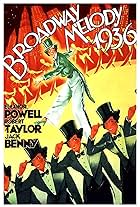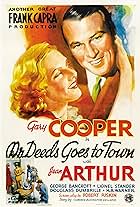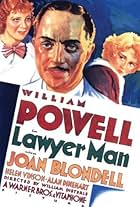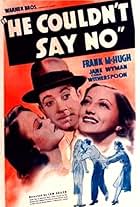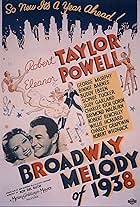West Point cadet Dick Thorpe falls in love with a girl, who turns out to be a princess from an European kingdom.West Point cadet Dick Thorpe falls in love with a girl, who turns out to be a princess from an European kingdom.West Point cadet Dick Thorpe falls in love with a girl, who turns out to be a princess from an European kingdom.
- Awards
- 1 win total
Carol Adams
- Dancer
- (uncredited)
Kay Aldridge
- Lady in Waiting
- (uncredited)
Featured reviews
Rosalie marked Nelson Eddy's first starring film without Jeanette MacDonald. That being the case MGM certainly didn't want Mr. Eddy to wander too far afield. If Nelson couldn't swap high notes with his co-star Eleanor Powell than at least all the kittenish banter that also characterized the Eddy-MacDonald movies was certainly left in tact.
MGM obviously bought this property after looking at the success Warner Brothers was having with Dick Powell in Flirtation Walk and Shipmates Forever. Powell was in his mid 30s when he did those roles as a cadet and midshipman respectively. Nelson Eddy was also in his 30s, in fact three years older than Dick Powell. But he looks like a man in his 30s and doesn't quite come off believably as a cadet.
That being said, movie audiences came to hear Nelson Eddy sing and MGM which scrapped the original score which was done by both Sigmund Romberg and George Gershwin, got Cole Porter to write a new one. And it's a good one. The title song Rosalie became a big hit, recorded by a number of artists and the classic In the Still of the Night is from this film. Oddly enough, probably because Nelson Eddy was so identified with operetta, these two Cole Porter songs never became identified with him per se.
Nelson also got the infinitely more talented Eleanor Powell as a co-star where Powell had Ruby Keeler for both his movies. MGM went whole hog on glamour with her numbers, probably the most spectacular she ever did on screen. She's also far more believable as a princess than Eddy as a cadet.
Supporting Eddy as his best friend and fellow cadet was Ray Bolger who has one dance number near a crate of fireworks which he accidentally sets off and sets off an revolution. Movies never knew quite what to do with Bolger. He certainly didn't have the look of a hero and most of his film roles were comedic supporting parts. On Broadway he was a big star and was the lead in such great hits as On Your Toes, By Jupiter, Charley's Aunt and The All American, only Charley's Aunt of which he did on screen.
Of course no one can talk about the supporting cast without mentioning two of the great players in studio era Hollywood. Frank Morgan and Edna May Oliver played off each other beautifully as Eleanor Powell's parents, the King and Queen of Romanza. Horsefaced faced Edna May Oliver played so many harridans in her career she practically took a patent out on those parts. That was one formidable lady on screen.
Complementing her completely was Frank Morgan's also copyrighted picture of befuddlement. Having read enough history to know that a whole lot of monarchs WERE as confused and befuddled as Morgan, lends a ring of authenticity to his role. He appeared almost exclusively for MGM in his career and was never bad in anything he did.
Rosalie was a prime example of the delightful nonsense that Hollywood used to do so well.
MGM obviously bought this property after looking at the success Warner Brothers was having with Dick Powell in Flirtation Walk and Shipmates Forever. Powell was in his mid 30s when he did those roles as a cadet and midshipman respectively. Nelson Eddy was also in his 30s, in fact three years older than Dick Powell. But he looks like a man in his 30s and doesn't quite come off believably as a cadet.
That being said, movie audiences came to hear Nelson Eddy sing and MGM which scrapped the original score which was done by both Sigmund Romberg and George Gershwin, got Cole Porter to write a new one. And it's a good one. The title song Rosalie became a big hit, recorded by a number of artists and the classic In the Still of the Night is from this film. Oddly enough, probably because Nelson Eddy was so identified with operetta, these two Cole Porter songs never became identified with him per se.
Nelson also got the infinitely more talented Eleanor Powell as a co-star where Powell had Ruby Keeler for both his movies. MGM went whole hog on glamour with her numbers, probably the most spectacular she ever did on screen. She's also far more believable as a princess than Eddy as a cadet.
Supporting Eddy as his best friend and fellow cadet was Ray Bolger who has one dance number near a crate of fireworks which he accidentally sets off and sets off an revolution. Movies never knew quite what to do with Bolger. He certainly didn't have the look of a hero and most of his film roles were comedic supporting parts. On Broadway he was a big star and was the lead in such great hits as On Your Toes, By Jupiter, Charley's Aunt and The All American, only Charley's Aunt of which he did on screen.
Of course no one can talk about the supporting cast without mentioning two of the great players in studio era Hollywood. Frank Morgan and Edna May Oliver played off each other beautifully as Eleanor Powell's parents, the King and Queen of Romanza. Horsefaced faced Edna May Oliver played so many harridans in her career she practically took a patent out on those parts. That was one formidable lady on screen.
Complementing her completely was Frank Morgan's also copyrighted picture of befuddlement. Having read enough history to know that a whole lot of monarchs WERE as confused and befuddled as Morgan, lends a ring of authenticity to his role. He appeared almost exclusively for MGM in his career and was never bad in anything he did.
Rosalie was a prime example of the delightful nonsense that Hollywood used to do so well.
Fans of Eleanor Powell will wonder how she detoured into this Jeanette MacDonald/Nelson Eddy overblown costume piece -- and in the role of Jeanette MacDonald no less! Whereas delicate Jeanette would have floated through this pageant with an air of fluttering dignity, pants-wearing Ellie delivers too much punch for a princess. She barks most of her lines and unfortunately comes off as a bitch. A more delicate actress would have softened the barrage of "womanly" insults laid on Nelson Eddy and we would know this meant she was smitten. But with the confidant and athletic Powell delivering the insults you really start to wonder if wooden Eddy is a masochist or just extremely submissive. It's an electric energy that cost Powell her spotlight, and didn't fit with MGM's idea of what a feminine leading lady should be.
Those who are fascinated by Ellie's unusual (at least on film) gender-play will be thrilled to see her "go all the way" and dress as a man to sneak into a military academy where she leads the cadets in a marching drill in front of a phallic war memorial. While Powell is hardly mannish (and here with Jeanette's wardrobe and make-up budget she never looked prettier) the production plays with her "masculinity" and dresses her in all extremes of buttoned-downed marching band jackets and crisp uniforms, interspersed with overly feminine gowns with frou-frou puffy sleeves and Jeanette's corkscrew curls. It's an inconsistent and mostly unsuccessful gender dichotomy -- especially when compared to her smart wardrobe play and winning charisma in the Broadway Melody films.
Her tap numbers are too few and too short -- a Pieroette "ballet" on giant drums is an weird jumble of inconsistent imagery, and a brief scene with Ray Bolger makes you wish they'd shared a competitive dance of lightning legwork rather than the time-wasting dialog in the script. Other supporting players are also underused: as the Queen Edna May Oliver appears briefly in a tiered nightgown that exaggerates her Olive Oil frame, and Frank Morgan does his best to keep the banter rolling as a befuddled monarch with a ventriloquist dummy, but there isn't enough comedy here to entertain. A sudden accidental revolution in the tiny Balkan monarchy has potential, but is dropped just as quickly. Even the production numbers are too short, following the pattern of the other MacDonald/Eddy films where actual choreography and musical style are ignored for lots and lots of extras arranged in expensive costumes and plenty of operetta bombast from Eddy.
Other than seeing Eleanor Powell in one of her few starring roles this is a forgettable film that shows no one to advantage, except possibly MGM's costume department. I can see how this was originally a vehicle for Marion Davies because the sets are jaw-droppingly huge.
Those who are fascinated by Ellie's unusual (at least on film) gender-play will be thrilled to see her "go all the way" and dress as a man to sneak into a military academy where she leads the cadets in a marching drill in front of a phallic war memorial. While Powell is hardly mannish (and here with Jeanette's wardrobe and make-up budget she never looked prettier) the production plays with her "masculinity" and dresses her in all extremes of buttoned-downed marching band jackets and crisp uniforms, interspersed with overly feminine gowns with frou-frou puffy sleeves and Jeanette's corkscrew curls. It's an inconsistent and mostly unsuccessful gender dichotomy -- especially when compared to her smart wardrobe play and winning charisma in the Broadway Melody films.
Her tap numbers are too few and too short -- a Pieroette "ballet" on giant drums is an weird jumble of inconsistent imagery, and a brief scene with Ray Bolger makes you wish they'd shared a competitive dance of lightning legwork rather than the time-wasting dialog in the script. Other supporting players are also underused: as the Queen Edna May Oliver appears briefly in a tiered nightgown that exaggerates her Olive Oil frame, and Frank Morgan does his best to keep the banter rolling as a befuddled monarch with a ventriloquist dummy, but there isn't enough comedy here to entertain. A sudden accidental revolution in the tiny Balkan monarchy has potential, but is dropped just as quickly. Even the production numbers are too short, following the pattern of the other MacDonald/Eddy films where actual choreography and musical style are ignored for lots and lots of extras arranged in expensive costumes and plenty of operetta bombast from Eddy.
Other than seeing Eleanor Powell in one of her few starring roles this is a forgettable film that shows no one to advantage, except possibly MGM's costume department. I can see how this was originally a vehicle for Marion Davies because the sets are jaw-droppingly huge.
The first half of this classic movie musical is good. The second half was a big disappointment.
The first half is interesting with likable characters and a couple of good song- and-dance numbers. The second half features a sappy romance and drags on too long.
Frank Morgan doesn't help things. His "bumbling king" character simply gets irritating after awhile. Eleanor Powell is miscast as a romantic "princess" lead. She just isn't that pretty or convincing as an actress. As everyone knows, she was a far better dancer than an actor
Nelson Eddy's singing is okay but, boy, does it sound corny and dated nowadays. Ray Bolger's comedy isn't funny; it's stupid.
On the positive side, some of the elaborate Busby Berkeley-type dance sets are elaborate and astounding. It's amazing to view. Powell's tap dancing is always entertaining, although I've seen better numbers from her in the Broadway Melody series.
The first half is interesting with likable characters and a couple of good song- and-dance numbers. The second half features a sappy romance and drags on too long.
Frank Morgan doesn't help things. His "bumbling king" character simply gets irritating after awhile. Eleanor Powell is miscast as a romantic "princess" lead. She just isn't that pretty or convincing as an actress. As everyone knows, she was a far better dancer than an actor
Nelson Eddy's singing is okay but, boy, does it sound corny and dated nowadays. Ray Bolger's comedy isn't funny; it's stupid.
On the positive side, some of the elaborate Busby Berkeley-type dance sets are elaborate and astounding. It's amazing to view. Powell's tap dancing is always entertaining, although I've seen better numbers from her in the Broadway Melody series.
The film has two Cole Porter songs -- "Rosalie" and "In the Still of the Night." For several bars of the latter, we see the back of Nelson Eddy as he sings to the back of Eleanor Powell. This daring shot is superb, because we can feel the effect of the song on both. Eddy is stiff, except when he sings. That stiffness is partly in the role as West Point cadet, but it's mostly Nelson. Powell has a great production number in her native Romanza, to which the unsuspecting Eddy has pursued her. Powell's best moments, though, occur as she commands a crack West Point drill team to the strains of "The Stars and Stripes Forever." The Souza march changes from 4/4 to waltz time for a Powell solo. The drill is an imaginative sequence that takes advantage of Powell's incredible skills. After all these years, you still say "Wow!" Frank Morgan is endearing as a king with an eye for the girls, while Edna May Oliver is completely convincing as his forever-angry wife. A couple of good moments occur when Morgan's puppet insults the Queen, speaking, as it were, for its puppeteer. Ray Bolger is completely wasted as Eddy's friend and Billy Gilbert's scenes, in which he sneezes over all bystanders, should have tasted the cutting room floor. But for its several great moments, this one is worth watching.
West Point cadet Dick (Nelson Eddy) falls for foreign princess Rosalie (Eleanor Powell). He doesn't know she's a princess, though (they never do in movies). Rosalie is called back to her country to marry another guy. Dick follows along to win her heart. When he finds out who she is and that she's engaged, he heads back to America. Then the movie ends with everybody miserable. Just kidding.
36 year-old Nelson Eddy as a West Point cadet is a stretch but we'll overlook that. He does fine and better than fine when singing. Eleanor Powell smiles her way through the whole picture but it's such a pretty smile that I doubt anybody minds. There's some funny parts, such as the airport guys and the ventriloquist bits. Great supporting cast includes Edna May Oliver, George Zucco, Virginia Grey, Reginald Owen, and future Oz costars Ray Bolger and Frank Morgan. Thickly-accented Ilona Massey plays Powell's friend. She's lovely to look at but hard to understand. With a cast like this and such good production values, it really should have been a classic. Unfortunately, there are some problems with it. For one, it's overlong. A movie with such a banal plot has no business being over two hours long. Also, the two leads have little romantic chemistry. They're both likable but there's just no spark.
It's a musical with Nelson Eddy and Eleanor Powell so, it stands to reason, most of us will watch for the singing and dancing. The Cole Porter songs are sung well. "In the Still of the Night" is the stand-out tune. As is usually the case with her movies, Powell's dancing is the highlight of the film. She gets three tap numbers, including an impressive routine on big drums. All three numbers are fantastic. Watching Powell dance is always a treat and you should watch the movie for that, if nothing else.
36 year-old Nelson Eddy as a West Point cadet is a stretch but we'll overlook that. He does fine and better than fine when singing. Eleanor Powell smiles her way through the whole picture but it's such a pretty smile that I doubt anybody minds. There's some funny parts, such as the airport guys and the ventriloquist bits. Great supporting cast includes Edna May Oliver, George Zucco, Virginia Grey, Reginald Owen, and future Oz costars Ray Bolger and Frank Morgan. Thickly-accented Ilona Massey plays Powell's friend. She's lovely to look at but hard to understand. With a cast like this and such good production values, it really should have been a classic. Unfortunately, there are some problems with it. For one, it's overlong. A movie with such a banal plot has no business being over two hours long. Also, the two leads have little romantic chemistry. They're both likable but there's just no spark.
It's a musical with Nelson Eddy and Eleanor Powell so, it stands to reason, most of us will watch for the singing and dancing. The Cole Porter songs are sung well. "In the Still of the Night" is the stand-out tune. As is usually the case with her movies, Powell's dancing is the highlight of the film. She gets three tap numbers, including an impressive routine on big drums. All three numbers are fantastic. Watching Powell dance is always a treat and you should watch the movie for that, if nothing else.
Did you know
- TriviaThe singing voice of Eleanor Powell was dubbed by Marjorie Lane (uncredited).
- GoofsDuring the 'drum dance' sequence there are three rows of huge drums all sounding together. The drum sticks on the front row are synchronized so that they all hit the drum at the same time. The drum sticks in the second and third rows are out of synch with the first row yet their sound is in synch.
- ConnectionsEdited into Hollywood: The Dream Factory (1972)
- SoundtracksRosalie
(1937) (uncredited)
Written by Cole Porter
Played during the opening credits and as background music often
Sung by Nelson Eddy
Danced by Eleanor Powell on a set of giant drums at the festival
Reprised by Nelson Eddy at the end
- How long is Rosalie?Powered by Alexa
Details
Box office
- Budget
- $2,000,000 (estimated)
- Runtime2 hours 3 minutes
- Color
- Aspect ratio
- 1.37 : 1
Contribute to this page
Suggest an edit or add missing content











